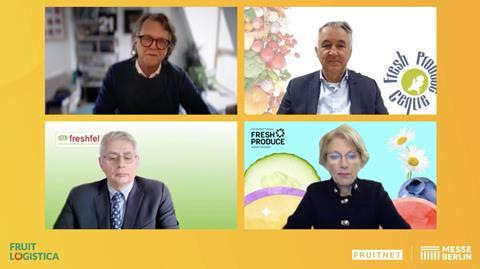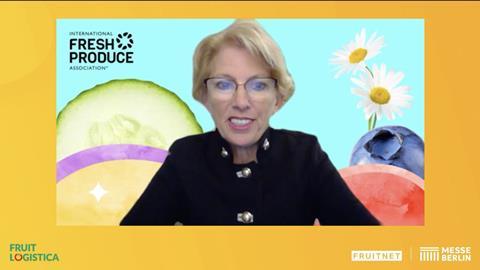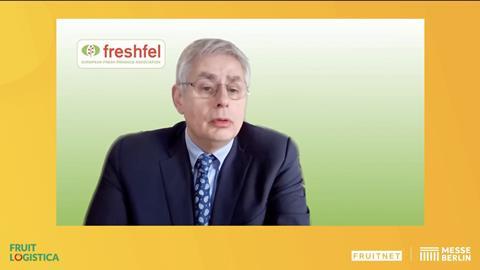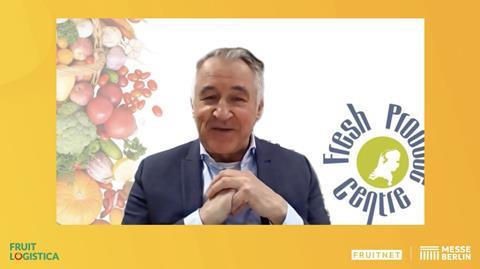Prominent figures voice concern over disruption that fresh produce companies can expect in the next 12 months, as Trump returns to the White House and political wrangling over climate change and sustainability continues

Just a couple of weeks before the international fresh fruit and vegetable business returns to Berlin for Fruit Logistica, the world’s leading fresh produce trade fair, Fruitnet’s Chris White welcomed three of the industry’s most important association heads to the show’s official media briefing.
It was a chance to question them on some big global trends, to understand what they expect to see in the years ahead, and in particular to gauge the impact they anticipate from a rapidly changing political and regulatory environment.
Top of the discussion agenda was Donald Trump’s inauguration as US president, which took place just 24 hours before – an example of the sort of political changes that are also happening across much of Europe too. Those changes are expected to have a big impact on the fresh fruit and veg business. Trump’s threat to impose tariffs on imports from Mexico and Canada, for example, could have wide-reaching consequences for the trade.
In addition, there were questions around the continued pressure on fresh produce suppliers to do more to protect the environment, while promoting healthier diets and increased consumption. In Europe especially, the environmental regulation debate is especially fierce.
As each of the media briefing’s three guests suggested, it’s going to be a busy, interesting, and challenging few years ahead.

Cathy Burns, president and CEO of the International Fresh Produce Association
“We will see some deregulation happening, based on previous experience of Trump 1.0. That will be favourable for our growers and hopefully the business community at large. Make America Healthy Again… Regardless of what that looks like, fruits and vegetables are a key component to the health of the nation and the health of the world, so we are optimistic.
“And we will certainly be pushing for policies related to incentives, to drive the consumption of fruits and vegetables. If we can drive consumption, there will be a much better environment for our growers and, quite frankly, anyone across the supply chain.
This is an administration that is going to care very much about business prosperity. Twenty-four hours into Trump 2.0, there is a lot to consider, a lot to learn, and quite frankly a lot to educate this administration on related to agriculture and certainly related to fruits and vegetables. But my experience with the administration is that they care very much about the prosperity of growers and of anyone across that supply chain.
“On tariffs, what we know for certain is that trade agreements are vital for sustaining our producers around the world. What that looks like, obviously we don’t know that yet. From my perspective, food security is a national security issue, regardless of what country you live in. The opportunity to have trade agreements that will continue to service different countries, that ultimately drive consumption for consumers… they need to make sense for all sides of the equation. I think that’s the due diligence that’s happening right now.
“We have already put forth our priorities to the new head of the USDA [Brooke Rollins]. She has a confirmation hearing coming up on Thursday. We have already sent her a letter with our priorities, to make sure that she is clear. Obviously, increasing consumption is number one. We need a Farm Bill, we need farm labour reform, we need market access issues to be resolved. The USDA in particular is a really strong partner of ours, and needs to be in the future. This 119th Congress has a lot at stake and a lot on their plate, and everyone I’ve talked to says they’re ready to get to work.”

Philippe Binard, general delegate of Freshfel Europe
“It’s important to see what is happening in the United States and the impact it will have on the world, for example around multilateralism, the WTO, the WHO, and the Paris agreement. These might change the general environment and priorities in different regions of the world.
“In Europe, we have to look at what’s happening in the US, but we also have to look at the other systems. We have the US model, which is more unilateralist. We have the European model, which still believes in the need to move towards more sustainability and address climate change. You have the brutal geopolitical system of Russia. And we cannot ignore the role that Asia’s super-economic power of giants, India and China, also can play.
“The fresh produce sector in Europe and elsewhere has always shown resilience in the face of different crises, ranging from covid to the war in Ukraine, from Brexit to the energy crisis, as well as climate and economic problems in the last few years. All of that has a significant impact on what we want to do at Freshfel, which is definitively securing more sustainable and healthier diets.
“We have to talk about what we want to achieve, which is increased consumption of fruit and vegetables. Not any more to 400g [per capita], but to 800g. That’s 400g for health, and 400g for the planet. We have a lot of work to do here, and it will be very interesting to see what might happen.
“We have our own debate in Europe, about the burden of shifting towards a more sustainable food system. It is quite challenging and it leads to a lot of reporting. We talk a lot in Europe about corporate social responsibility reporting, about environmental footprint. Will the US follow this same path?
We have a lot of global companies in the fresh produce sector, which work in both the US and European markets. That might have a significant impact with companies if the two major continents in terms of population, consumption of fruit and vegetables, and international trade fall completely apart with their priorities.
“In Europe we also have for the moment a certain prevalence demanded between the Green Deal and the Farm to Fork strategies, which have marked the previous legislative term in Europe and are mainly driven by the environmental pillars. Now there is suddenly, for competitiveness issues and maybe health aspects, to make sure that the other pillars of sustainability – maybe social and economic ones – are in better balance with the environmental pillar.
“We have some interesting years ahead. For the next four to five years, we have a completely new agenda. And we will have to cope with that. We are small users of plant protection products, but maybe even more limits will be needed because of climate change and emerging pests. But we are also part of the solution, with carbon sequestration in orchards and other positive contributions to fight climate change.”

Richard Schouten, director of Fresh Produce Centre (GroentenFruit Huis)
“The political situation in Europe is disturbed at the moment. In Brussels a new government was chosen last year and they are looking again at the market and the position of farmers, which is maybe positive. And maybe the Green Deal has changed a little. But in the long term, we are still thinking that you have to work on sustainability. I see some negative things, and for example the attention in Europe on bugs and pesticides is bigger than in the US. But we have to face that.
“When you look at the United States, and you look at the import and export figures for Europe, fruits and vegetables are balanced between those two continents. And it’s not such a big deal in money terms. I am more concerned about what will happen with countries like Mexico, Peru and also maybe Canada. If they want to export to the US and they face a 20 per cent tariff, that could disturb the market. I already heard that the Mexican people are looking at new markets, for example India, Indonesia, Japan, China and Russia, but also Europe. That will influence the price of products like avocados.
“If the US is changing, for us in Europe it’s very important that we work still on supplying healthy and sustainable food. It’s important that we as global suppliers cooperate and make our own standards. Don’t wait until political people make them, because they are always changing their plans. We have to do it ourselves. It’s in our veins to do that.
“Europe must work together with the US and Canada. We do already and we must continue that. This is the future and we need more fruits and vegetables to grow. We have to do it in a sustainable way. Our message is: don’t just wait on the politicians, let’s make our own plan.”



